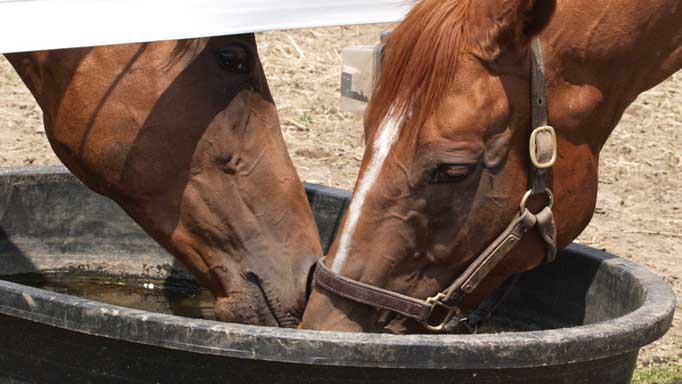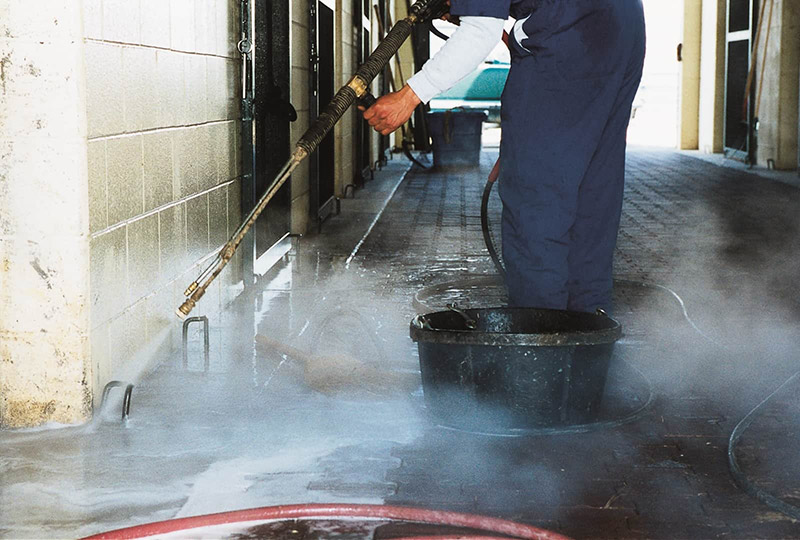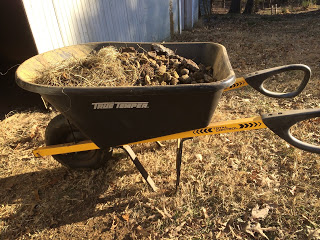Section 3 | Biosecurity and Health Management on Ontario Equine Premises
Industry
Page 16 /
Facility Management to Reduce the Spread of Disease
A horse’s environment can play a significant role in determining whether an animal exposed to a pathogen is able to defend itself or succumb to illness. Animals should be housed in barns that are clean and given access to high quality feed, water, and bedding.
Feed
Ensure feed is sourced from registered feed mills or a facility that performs quality control. Feed should then be stored appropriately to prevent pests, spoilage, and contamination with urine or manure.
Water
Horses should be provided fresh water on a daily basis. The use of communal water sources should be discouraged to reduce the risk of disease transmission. Animals should be prevented from drinking from ponds or natural waterways to prevent exposure to disease-causing pathogens.

Source: Canadian Thoroughbred
Bedding
Damp, moist environments can harbour bacteria. The use of ample, absorbent bedding will help to reduce moisture accumulation in stalls and reduce bacterial growth. Stalls should be mucked and have fresh bedding added daily. This will remove manure and urine from the horse’s resting and feeding environment. Prior to allowing a new animal to occupy a stall, that stall should be cleaned and disinfected with fresh bedding added.
As with feed, ensure bedding is stored in a dry area and prevent pests from accessing, and prevent contamination by urine and/or manure.
Hygiene
Stalls, trailers, and paddocks should be disinfected before a new animal is introduced, to prevent the spread of pathogens from the previous occupant. Implement and train all staff to clean stalls, trailers, water and feed buckets, gates, surfaces, and equipment on a regular basis. It is important to note that prior to disinfection, surfaces must be free of manure for the disinfectants to be effective.
Work with your veterinarian to develop good disinfecting protocols and ensure that disinfectants are being used according to label instructions to prevent harm to both humans and horses.

Source: The Horse.com
Air Quality and Ventilation
Respiratory disease can often be spread through airborne droplets when infected animals deposit bacteria and viruses into the air through sneezing, coughing, whinnying and snorting. Ensuring that there is a constant flow of fresh, clean air to horses will reduce the amount of airborne particles they inhale. Installing fans can help to remove stale air and maintain continuous flow. Remember, the more animals in a particular area means more bacteria and viruses may be present.
Accumulation of ammonia reduces air quality which can contribute to respiratory disease by irritating the lining of the airway which allows bacteria to enter into the lungs. Ensure stalls are cleaned regularly to prevent manure and urine accumulation.
Manure Management
Manure is a significant source of bacteria. Manure should therefore be removed at least daily from stalls, and weekly from pastures and paddocks. Manure should be stored and/or composted away from animals and the barn to prevent ingestion or contamination of surfaces. This will also help to reduce flies.
Any personnel handling manure should wear disposable or washable gloves or wash hands promptly afterward

Source: Leanna Hollis
Minimize the contamination of feed by manure by ensuring that there are designated tools (pitch forks, wheelbarrows, etc.) for manure handling that are separate from those used for feeding. It is also advisable to have feed and water buckets raised off the floor to prevent contamination. Regardless of their purpose, this equipment should be cleaned and disinfected regularly.
For more information on hygiene and facility management, check out our page, Improving Biosecurity on the Farm.